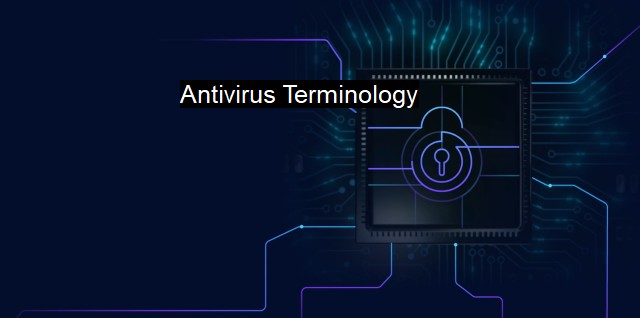What is Antivirus Terminology?
Unraveling Antivirus Terminology: Understanding the Language of Cybersecurity to Combat Malware and Ensure Computer Protection
Antivirus terminology is a collection of specialized jargon, phrases, abbreviations, and words pertaining to computer security, specifically focusing on antivirus systems. A proper grasp of these terms is integral for anyone working a field dedicated to protecting computer systems and networks from theft, damage, or interference.Let's start with the term "antivirus" itself. Derived from biology, this term refers to a series of software scripts developed to detect and remove malicious scripts typically called 'viruses.' These are harmful computer programs that can alter or delete data, hijack system controls, or replicate themselves on other systems, potentially leading to severe compromise on information security.
The term "malware" is another critical term in antivirus terminology. It is a blanket term for any software intentionally designed to cause harm to a computer, server, client, or computer network. Under this umbrella fall familiar sub-categories such as viruses, worms, trojans, ransomware, to name a few, each exhibiting unique characteristics.
A "virus," much akin to its biological counterpart, is a type of malicious software capable of self-replication. These often attach themselves to host programs, corrupting data and system processes and might carry 'payloads'—either self-contained or downloaded from the web—causing extensive damages.
"Worms" are another type of malware, but unlike viruses, they can spread without user action as they can self-replicate and tunnel through a computer network. They typically consume bandwidth and resources, causing systems to slow down or crash.
"Trojans," named after the Greek mythology story, masquerade as legitimate software but pave the way for unauthorized access to a user's system. While they cannot self-replicate like viruses or worms, they can create 'backdoors' for other types of malware to enter a system.
"Ransomware" is a painfully current term which refers to malicious software designed to block access to a computer system and encrypting the user’s data until a ransom has been paid.
In antivirus terminology, the diverse means an antivirus program employs to seek out, warn about, and remove threats are called "scans." Regular, comprehensive system analysis is crucial for robust security posture.
Terms such as "quarantine" is used to describe isolating suspicious or infected files rendering them harmless. While "heuristics" is a strategy for faster, more efficient virus detection by identifying patterns and establishing rules.
"Firewalls" are a digital barrier between a secured internal network and an 'untrusted' external one (like the internet), controlling and monitoring the data packets allowed to pass through, filtering out malicious ones.
'Sandboxing' is another term that refers to a virtual space allowing programs to run so that they can be examined for malignant or destructive behavior in a controlled environment.
'Phishing' is a type of social engineering attack, typically carried out through deceptive emails masquerading as legitimate inquiries, which trick recipients into revealing sensitive information such as passwords and credit card numbers.
These are just some terms among a myriad of others. Antivirus terminology is a complex field, and understanding its intricate terms is crucial for anyone looking to delve into the world of cybersecurity or working to protect their homestead or workplace from potential cyber threats. Real-time protection, firewall, phishing protection, and rootkit detection, among many others, are concepts one would encounter daily in the world of computer security, illustrating the wide scope and deep sophistication this field embodies. Understanding these terminologies can assist users in effective decision-making and utilizing cybersecurity practices better.

Antivirus Terminology FAQs
What is the difference between malware and a virus?
Malware is an umbrella term that refers to any malicious software, while a virus is a specific type of malware that self-replicates and infects other files. In simpler terms, all viruses are malware, but not all malware are viruses.What does real-time protection mean for antivirus software?
Real-time protection means that the antivirus software actively monitors your computer and its activities in real-time, scanning for any potential threats as they happen. This is different from manual scanning, which only scans your computer at set intervals or when prompted by the user.What is the difference between a signature-based and a behavior-based antivirus?
Signature-based antivirus relies on a database of known malware signatures to detect and block threats, while behavior-based antivirus analyzes the behavior of files and programs to identify potential threats. Signature-based antivirus is more reliable in detecting known threats, while behavior-based antivirus can identify new or unknown threats.What is a false positive in antivirus software?
A false positive occurs when an antivirus software identifies a file or program as malicious when it is actually safe and legitimate. This can happen when the antivirus software detects a behavior or code that resembles that of malware, but is actually harmless. False positives are a common issue with antivirus software and can sometimes lead to legitimate files or programs being quarantined or deleted.| | A | | | B | | | C | | | D | | | E | | | F | | | G | | | H | | | I | | | J | | | K | | | L | | | M | |
| | N | | | O | | | P | | | Q | | | R | | | S | | | T | | | U | | | V | | | W | | | X | | | Y | | | Z | |
| | 1 | | | 2 | | | 3 | | | 4 | | | 7 | | | 8 | | |||||||